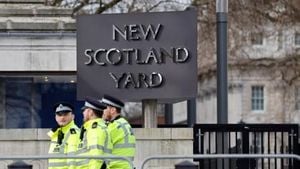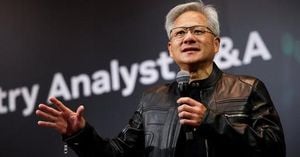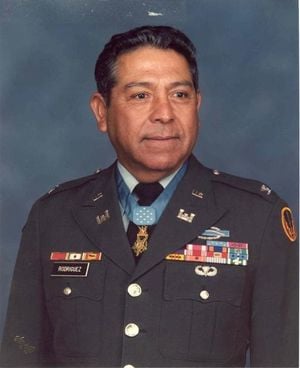Christopher Columbus, the iconic figure known for his expeditions leading to the European colonization of the Americas, has long been shrouded in mystery, especially concerning his origins. Now, new DNA testing has thrown fresh light on this 15th-century navigator. Spanish researchers have concluded through extensive genetic analysis spanning over two decades, culminating in revelations broadcasted on national television, RTVE, and sharpened intrigue around Columbus's true identity, tying him to Jewish ancestry. According to their findings, Columbus was of Sephardic Jewish descent, from western Europe. Notably, these results align with historical narratives pointing to the complex and often hidden heritage of Columbus amid the turbulent socio-political climate of his time.
This groundbreaking discovery came from initiatives led by forensic expert Miguel Lorente and his team at the University of Granada. They conducted 22 years of research, examining remains previously attributed to Columbus, buried within the ornate Seville Cathedral—long recognized as his final resting place but once surrounded by conflicting claims about his burial and origins. 'We've confirmed the remains belong to Columbus with absolute certainty,' said Lorente, emphasizing the careful methodologies used to derive the DNA evidence. Remarkably, they managed to retrieve both mitochondrial DNA from his son, Hernando, and paternal links indicative of traits associated with Jewish heritage.
Before the sweeping edicts of Catholic Monarchs Isabella I and Ferdinand II led to the expulsion of Jews and Muslims from Spain, the Iberian Peninsula housed around 300,000 Jews. The term "Sephardi" itself originates from Sefarad, which references the rich cultural configuration of Jews from Spain. The significance of Columbus’s Jewish roots resonates particularly loudly today, as it highlights the incongruity of his identity against the backdrop of the expulsion order, executed the year Columbus sailed to the New World. It accentuates the irony: the veryindividual who opened the door to unprecedented European expansion and conquest was possibly from the very community defined as outsiders by his royal patrons.
The saga of Columbus’s heritage has long been contested. While earlier theories posited he was from Genoa, Italy, some researchers now argue this notion lacks substantiation—particularly during historical periods when Jewish people faced stringent laws against their residency and social mobility across much of Italy. For example, historian Francesc Albardaner argued, 'Jews could only spend three days at a time in Genoa by law,' which raises complex questions about Columbus’s purported origins.
The DNA study indicates origins consistent with those of eastern Spanish Jewish silk spinners, supported by the inference of Columbus's potential birth location based on the genetic characteristics unearthed. While he could not categorically pin down which specific region or nation Columbus hailed from, Lorente noted the markers point strongly to the western Mediterranean region. The ramifications of these findings extend not just to Columbus's biography, but also conduct discussions of race, identity, and historical interpretation.
Throughout history, historians have proposed various theories about Columbus's ancestry. Speculation has ranged from asserting he was Basque or Portuguese to scenarios of Greek, Catalan, or even British descent. Consistent with earlier assertions, DNA analysis focused primarily on bones believed to belong to Columbus and his relatives. The technology employed is cutting-edge, using trace analyses to compare residual content from his remains against known family members. Overall, these findings not only seek to clarify who Columbus was but alter the narrative surrounding his legacy.
On October 12, the results were revealed as part of Spain's National Day program on RTVE, intentionally coinciding with Columbus Day, shorelining the timing poignantly. While the revelations have created excitement among some historians, others urge caution around interpretations to refrain from drawing conclusions without rigorous peer review. Antonio Alonso, a geneticist, vocalized his skepticism, declaring the lack of publicly available analysis undermined the study's integrity. He remarked, "Unfortunately, from a scientific standpoint, we can’t really evaluate what was noted on the documentary because they offered no data from the analysis whatsoever."">
This skepticism is echoed by Rodrigo Barquera, who emphasizes the importance of traditional scientific peer reviews, traditionally conducted before drawing public conclusions on such historical assessments. Nonetheless, it is notable how these findings intertwine with broader discussions around personal identity and heritage across demographics, particularly within Jewish communities who have undergone significant historical persecution.
Upon Columbus's death at the age of 55, he expressed his wish of being buried on the island of Hispaniola, presently home to the Dominican Republic and Haiti. Yet, his remains have traveled extensively, from being initially buried on Hispaniola to moving to Cuba and finally landing at the Seville Cathedral. This back-and-forth of burial places hints at the chaotic legacy Columbus has left behind—one of discovery, colonization, and now, identity.
Looking back, Columbus's life unveils not just the conquests of new worlds but also the struggles of a man caught between identities during an era rife with anti-Semitism and persecution. If he hid his Jewish ancestry from the world, as suggested by the findings, the risks he faced were significant. Discrimination against Jews was severe; the fear of being outed meant concealing one's identity was commonplace among conversos—Jews who adopted Christianity to escape persecution.
Columbus has long been venerated as the pioneer who discovered the New World. Yet, this newfound layer of his heritage encourages reflection on how complex narratives can alter the perception of historical figures. The move to reclaim Columbus must grapple with the contradictions of his accomplishments against the harsh realities he would have navigated. Historians continue to debate the appropriateness of celebrating his legacy amid colonial atrocities endured by native populations.
Many are left wondering how this new identity will reshape the discourse around Columbus and heritage within broader dialogues surrounding representation, cultural exchange, and restitution. The repercussions of the study may resonate beyond academic confines, influencing community discussions among the descendants of Sephardic Jews worldwide. What does it mean to belong? How do heritage and belief systems weave together to enrich one's identity? These are questions yet to be explored as history continues to revisit its figures like Columbus, bearing witness to the need for truth and reconciliation across nations and communities.
With the intersection of DNA analysis, history, and identity, Columbus's story stands at the crossroads of ancient legacies and modern interpretations, beckoning the question: who was Christopher Columbus really? The exploration for answers may just be beginning, threading together realms of familial ties, ancestry, and identity as the intricacies of heritage reemerge.



